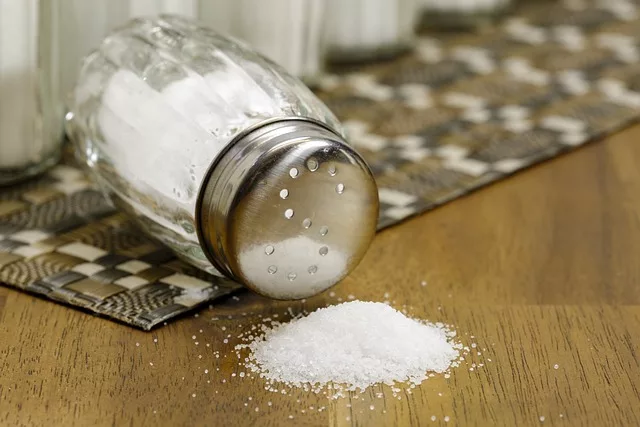Salt, a common ingredient found in our daily meals, has been linked to fluid retention, a condition characterized by excess water accumulation in the body. While excessive salt intake can indeed contribute to fluid retention, it is essential to understand the role of salt in our bodies and how to use it to our advantage while also taking necessary precautions.
Understanding Salt and Fluid Retention
Salt, or sodium chloride, plays a vital role in maintaining the body’s fluid balance. It helps regulate the volume of blood and extracellular fluid, ensuring the proper functioning of cells and tissues. However, excessive sodium intake can disrupt this delicate balance, leading to fluid retention.
How It Works
When we consume salt, the body’s intricate system works to maintain a delicate balance of fluid and electrolytes. Sodium, the primary component of salt, plays a critical role in this process. However, excessive sodium intake can disrupt this balance and contribute to fluid retention.
The kidneys play a vital role in regulating the body’s fluid and electrolyte levels. They filter the blood and selectively reabsorb sodium and water to maintain a balance within the body. When we consume excess salt, the concentration of sodium in the blood increases. To restore equilibrium, the kidneys retain water to dilute the higher sodium concentration. This leads to an increase in blood volume.
The increased blood volume places additional strain on the cardiovascular system. The heart has to work harder to pump the larger volume of blood, and the blood vessels experience increased pressure. This can result in edema, which is the accumulation of excess fluid in tissues, particularly in the lower extremities, hands, and face.
Symptoms of Excessive Fluids
Fluid retention caused by excessive salt intake can manifest as swelling, bloating, and weight gain. It is important to note that the degree of fluid retention can vary from person to person. Some individuals may be more sensitive to sodium than others, meaning they are more prone to fluid retention with even small increases in salt intake.
Using Salt to Our Advantage
It is worth noting that the body needs a certain amount of sodium for proper physiological function. Sodium is essential for nerve transmission, muscle contraction, and maintaining fluid balance. Striking a balance between adequate sodium intake and avoiding excess is crucial.
While it is crucial to consume salt in moderation, certain situations warrant utilizing extra salt:
- Rehydration during Physical Activity: When engaging in intense exercise or activities that induce sweating, electrolytes, including sodium, are lost. Replenishing these electrolytes through sports drinks or foods with a moderate amount of salt can aid in rehydration and prevent muscle cramps.
- Managing Low Blood Pressure: In some cases, individuals may experience low blood pressure, leading to symptoms such as dizziness or fatigue. A slightly higher salt intake, under medical supervision, can help increase blood volume and improve symptoms.
Exercising Caution and Precautions
It is essential to exercise caution to prevent excessive fluid retention and its associated health risks. Consider the following precautions:
- Reduce Processed and Packaged Foods: Processed and packaged foods often contain high levels of sodium. Limiting consumption of these items can significantly reduce salt intake and minimize the risk of fluid retention.
- Read Food Labels: Be mindful of the sodium content in food products by reading labels carefully. Opt for low-sodium or salt-reduced alternatives whenever possible.
- Balance Sodium Intake with Other Nutrients: Consuming a diet rich in potassium, magnesium, and calcium can help counterbalance the effects of excess sodium and promote a healthy fluid balance.
- Seek Medical Advice: If you have existing health conditions such as hypertension, kidney problems, or heart disease, it is crucial to consult with a healthcare professional for personalized guidance on salt intake.
Salt plays a vital role in the body’s fluid balance, but excessive consumption can lead to fluid retention and associated health risks. By striking a balance, we can harness the benefits of salt while safeguarding our health and well-being.
Salt and Sugar
-

10 Powerful Tips to Curb Sugar Cravings and Improve Your Health
Introduction: Sugar cravings can be a challenge when trying to maintain a healthy diet. The intense desire for sugary treats can derail your efforts to eat nutritiously and lead to unwanted weight gain and negative effects on your overall health. In this article, we will provide you with 10 effective tips to help you stop…
-

The Role of Salt in Fluid Retention and How to Use This for Health
-

Salt and Sugar Can Hurt Your Gut Health
-

The Truth About High Fructose Corn Syrup: Why It’s Bad for You
-

What is Sugar Addiction and How to Beat It
-

Quit Artificial Sweeteners NOW! Understanding the Risks to Your Health
-

Best Sugar Alternatives to Sweeten Your Tea and Coffee








Leave a Reply